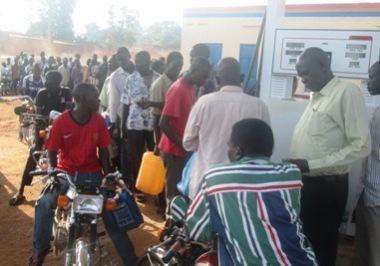Fuel shortage hits S. Sudan’s Bahr el Ghazal region
September 12, 2014 (WAU) – A fuel shortage has hit South Sudan’s Greater Bahr el Ghazal regions, with some stations in Western Bahr el Ghazal capital Wau remaining closed since Wednesday.

“The massive shortage of fuel which hit the regions just within a week was caused by poor roads linking to the states as foreign suppliers from Mombasa in Kenya finds it hard to pass through Juba to Bahr el Ghazal regions,” said Mohamed Dawut, the manager of Runway station in Wau.
Runway is the only station in Wau town which still has some remaining fuel supplies, although Dawut says that it is likely to run out within a day.
Other outlets in Wau, including Turbi, Kost Kosta, Transway, Nile Petroleum and Star Gass have already exhausted their supplies.
“The whole region is being hit by the fuel shortage. We are right now implementing the state government’s orders not to increase the price from 9 SSP per litre to any cost,” said Dawut
Fuel prices at the local markets have shot up since the shortages hit, reaching as high as 25 South Sudanese pounds (SSP) per litre.
Meanwhile, local traders in the region have blamed the South Sudanese government for relying on foreign suppliers, rather than letting South Sudanese supply their own country with fuel from Mombasa port.

Motorists have also blamed local businesses for buying up large volumes of fuel from local stations and then storing it, saying the practice had contributed to the shortages.
The fuel crisis has also raised the cost of transport, with operators increasing meter prices for distances within the town, while hotel operators have been forced to reduce their power supply from 24 hours to less than eight hours per day.
There is now growing criticisms across the country over the government’s failure to capitalise on South Sudan’s large oil reserves, which it acquired after seceding from Sudan in 2011.
However, three years after gaining independence South Sudan is still without a proper oil refinery system, which would significantly lower the cost of fuel to its citizens, as well as reduce dependence on foreign oil exports from neighbouring Kenya.
(ST)
